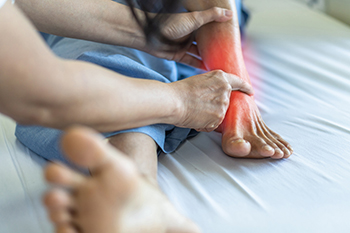- Home
- Our Doctors
- Our Offices
- New Patients
- Patient Education
- Blog
- Contact Us
- Patient Portal Help



Ankle pain while running can be a frustrating setback for any athlete. Several factors contribute to this discomfort, ranging from overuse injuries to biomechanical issues. Often, runners experience ankle pain due to excessive strain on the ligaments and tendons surrounding the ankle joint. This strain can result from repetitive movements, improper footwear, or inadequate warm-up routines. Additionally, running on uneven surfaces or sudden changes in terrain can exacerbate ankle pain by causing instability and stress on the joints. Poor running form, such as overpronation or supination, may also lead to ankle pain over time. Ignoring early signs of discomfort can worsen the condition and potentially lead to more severe injuries. To prevent ankle pain, runners should prioritize proper footwear, gradual training progressions, and regular stretching exercises to maintain flexibility and strengthen the ankle muscles. If you have developed ankle pain, and feel it may be due to running, it is suggested that you consult a podiatrist who can offer you correct treatment options, in addition to effective preventive techniques.
Ankle pain can have many different causes and the pain may potentially be serious. If you have ankle pain, consult with one of our podiatrists from Foot & Ankle Institue. Our doctors will assess your condition and provide you with quality foot and ankle treatment.
Ankle pain is any condition that causes pain in the ankle. Due to the fact that the ankle consists of tendons, muscles, bones, and ligaments, ankle pain can come from a number of different conditions.
Causes
The most common causes of ankle pain include:
Symptoms
Symptoms of ankle injury vary based upon the condition. Pain may include general pain and discomfort, swelling, aching, redness, bruising, burning or stabbing sensations, and/or loss of sensation.
Diagnosis
Due to the wide variety of potential causes of ankle pain, podiatrists will utilize a number of different methods to properly diagnose ankle pain. This can include asking for personal and family medical histories and of any recent injuries. Further diagnosis may include sensation tests, a physical examination, and potentially x-rays or other imaging tests.
Treatment
Just as the range of causes varies widely, so do treatments. Some more common treatments are rest, ice packs, keeping pressure off the foot, orthotics and braces, medication for inflammation and pain, and surgery.
If you have any questions, please feel free to contact one of our offices located in St. George, Hurricane, and Cedar City, UT and Mesquite, NV . We offer the newest diagnostic and treatment technologies for all your foot care needs.
Having issues or need help with your portal?
Click here for Instructional Videos